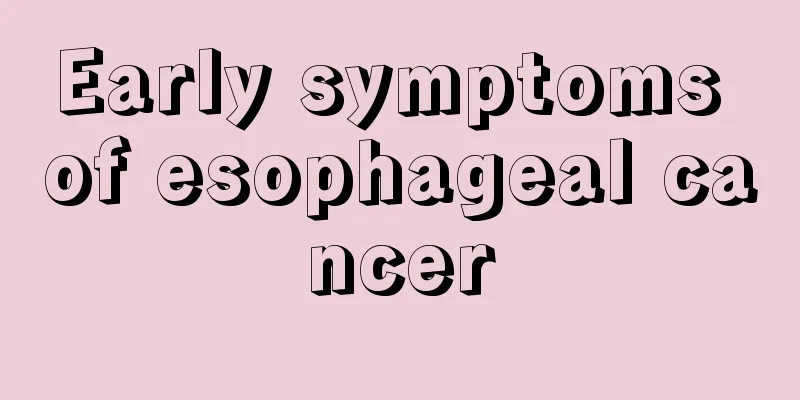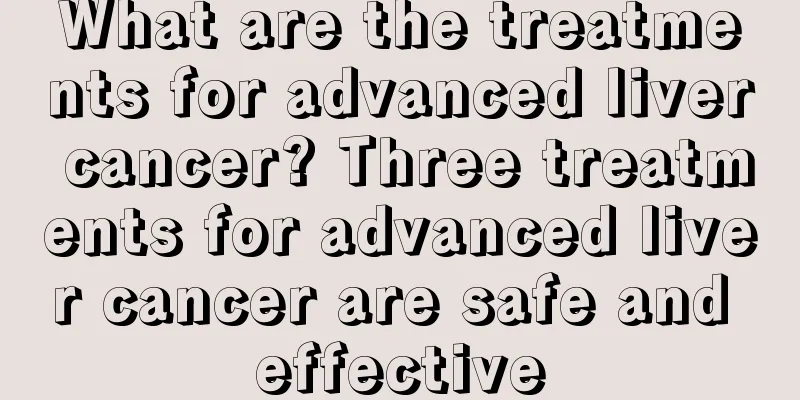Early symptoms of esophageal cancer

|
Esophageal cancer is a serious malignant tumor of the digestive tract. Its early symptoms include difficulty swallowing, chest pain, weight loss, hoarseness, and coughing or vomiting. The specific symptoms are as follows: 1. Dysphagia: This is the most common early symptom of esophageal cancer, which manifests as a foreign body sensation or obstruction when swallowing food. Patients may have difficulty eating solid food, and as the disease progresses, they may even feel discomfort when drinking water. If you have difficulty swallowing, you should seek medical attention in time and undergo a detailed examination to rule out the possibility of esophageal cancer. The doctor may recommend an endoscopy or esophageal angiography to confirm the cause and develop a treatment plan. 2. Chest pain: Some patients experience chest pain or discomfort in the early stages, which usually worsens when eating. This pain may manifest as a burning or dull pain behind the sternum, sometimes accompanied by a feeling of angina. When chest pain symptoms occur, you should seek medical attention in a timely manner and undergo chest imaging tests, such as chest X-rays or CT scans, to determine the cause. If the pain is related to eating, you need to be more alert to the possibility of esophageal cancer. 3. Weight loss: Due to reduced food intake caused by esophageal stenosis, patients often experience unexplained weight loss. Weight loss is one of the common symptoms of cancer patients and is often related to insufficient nutritional intake and increased metabolism. Continued weight loss should be taken seriously and medical examination should be sought as soon as possible to rule out the possibility of malignant tumors. The doctor may recommend blood tests and imaging tests to assess overall health. 4. Hoarseness: When the tumor compresses the recurrent laryngeal nerve, it may cause hoarseness. This symptom is more common in patients with advanced esophageal cancer, but it may also occur in the early stages. If hoarseness persists, you should see a doctor as soon as possible and undergo a laryngoscopy. The doctor will check the vocal cord function to confirm whether the tumor is compressing the nerve and causing the voice change. 5. Coughing or vomiting: Early esophageal cancer may cause reflex coughing or vomiting, especially after eating. Reflex coughing is caused by esophageal lesions stimulating the vagus nerve, and vomiting may be caused by obstruction of food passing through the esophagus. If you have frequent coughing or vomiting, you should see a doctor as soon as possible and undergo digestive tract examinations. The doctor may perform an esophagoscopy or other imaging examinations to determine whether there are lesions in the esophagus. In order to detect esophageal cancer as early as possible, you should maintain a good lifestyle, avoid excessive smoking and drinking, and have regular health checks. Especially those with a family history of esophageal cancer or long-term gastroesophageal reflux symptoms should pay more attention to esophageal health and seek medical attention in time. |
<<: Intestinal cancer usually causes pain in three places
>>: Is inverted nipple a sign of early breast cancer?
Recommend
Is it good or bad to trim the hair on private parts
For many women, the question of whether to cut pu...
What causes soft fibroma
Soft fibroma is a disease of hyperkeratosis of th...
Can cervical kyphosis be restored?
Our cervical vertebra is a part of the spine and ...
Breast Pressure Bandage
Because people usually do not pay attention to th...
How long can you live with lung cancer
How long can you live with lung cancer? Many peop...
What to do if you have itchy scalp and hair loss? There are four mitigation methods
Itchy scalp and hair loss have always been a majo...
Is prostate cancer dangerous?
The extent of the harm caused by prostate cancer ...
Can hyaluronic acid shrink pores?
The effect of hyaluronic acid in beauty is quite ...
What are the symptoms of ovarian cancer
Hello everyone, today we have prepared some knowl...
Can I put green radish in a pregnant woman's room?
The leaves of the green radish are extremely deli...
How to use disposable masks
As the air quality is getting worse and worse, di...
How much does colorectal cancer surgery cost
How much does colorectal cancer surgery cost? Col...
What causes eyebrows to turn white? Is it premature aging?
Graying of eyebrows is quite common in daily life...
Correct sleeping position and care methods after double eyelid surgery
People often say that eyes are the windows to eve...
My stomach is hard at 8 and a half months of pregnancy?
When a woman is more than eight months pregnant, ...









